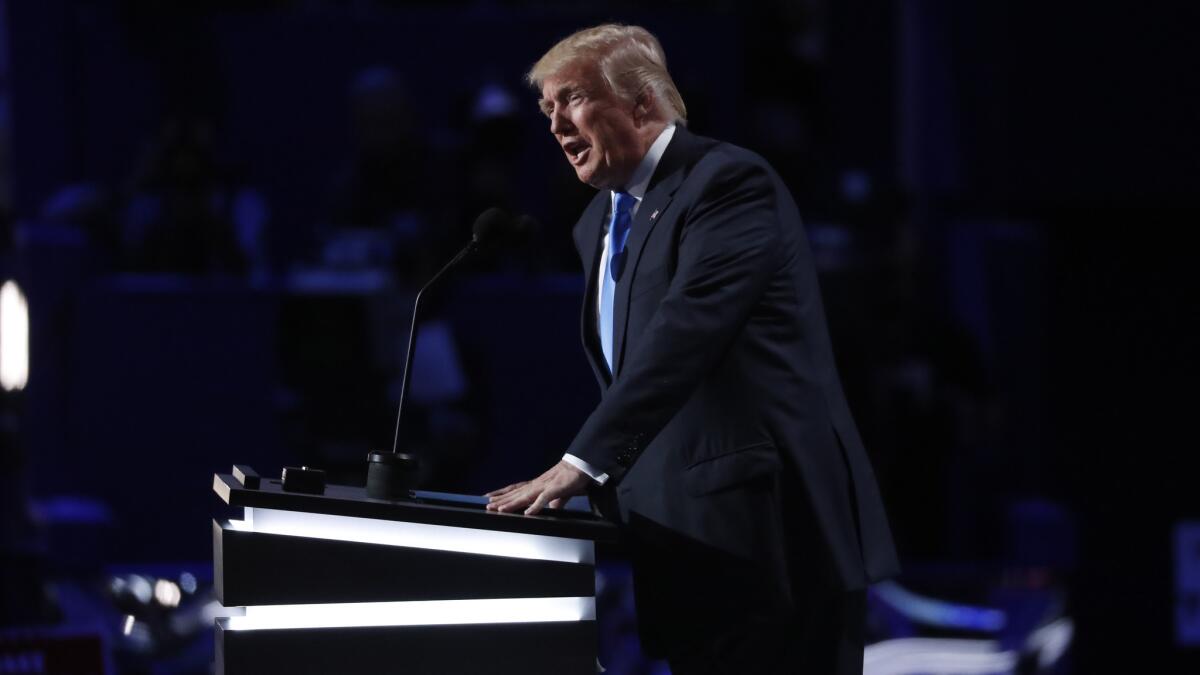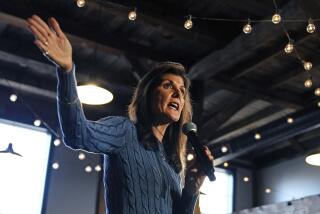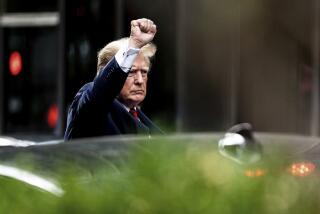Op-Ed: Is a coup possible under Trump? What does Melania’s plagiarism signify? And more opinionated dispatches from the convention

Los Angeles Times Opinion has asked Washington columnist Doyle McManus as well as other political observers to send their thoughts on the Republican Convention in Cleveland as it unfolds.
Doyle McManus: A failure so far
A modern political convention, now that it’s no longer about choosing a nominee, is supposed to be a well-crafted infomercial – a four-day miniseries that energizes party loyalists and attracts undecided voters into their camp. By that measure, after its first two days, Donald Trump’s shambolic gathering is failing.
It isn’t unifying the Republican Party. It isn’t making Trump more appealing to skeptics. It hasn’t offered much solace to audiences who feel demeaned by some of Trump’s language: women, African Americans, Latinos.
Trump’s campaign manager, Paul Manafort, has said his goal this week is to “expand” voters’ view of Trump and win some converts, just as Ronald Reagan did in 1980. And yet he started off the festivities by denouncing Ohio Gov. John Kasich – who is not attending the convention, even though it’s in his own state – as “dumb, dumb, dumb.” “When is John Kasich going to grow up?” he asked. (In victory, magnanimity.)
Then the Trump majority refused to give minority #NeverTrump delegates a roll call vote on rules changes, even though they were almost certain to lose. “He’s shown us that we’re not wanted,” said Kendal Unruh, a Ted Cruz delegate.
Meanwhile, the convention speakers have focused more on the depredations of Barack Obama and Hillary Clinton than on the hitherto undetected virtues of the man the GOP nominated on Tuesday.
A parade of politicians and minor celebrities accused Obama of ignoring terrorism (not really true) and presiding over higher crime rates (definitely not true). One, soap opera actor Antonio Sabato Jr., said after his speech that he is “absolutely” sure Obama is a Muslim (also not true). Ben Carson said Clinton is dangerous because she once sought advice from radical scholar Saul Alkinsky, whom he described as an admirer of Lucifer. (He wasn’t.)
Slamming the other party is a compulsory exercise at a political convention, of course. And loathing Clinton may be the glue that holds the GOP together. But many of the speakers nearly forgot to talk up the man they want to be president.
“One remarkable thing about this campaign is that you have a large number of undecided voters, mostly because they don’t like either candidate,” GOP pollster David Winston told me.
“Those voters don’t know how to choose between them. They need a framework for making a decision. And the convention can help provide that.”
He added, “It can’t just be about why the other side is wrong. The candidates … have to define their visions of a future for the country.”
That’s a good description of what’s been missing from Trump’s campaign, and an explanation for why he’s lagging behind Clinton in all but a few polls. The convention is supposed to change that, but so far it’s been a series of missed opportunities.
Not until late Tuesday, the convention’s second evening, did anyone talk at length about Trump’s character in new and positive ways. The most effective was his 22-year-old daughter, Tiffany Trump, who said he dad “draws out the talent and drive in people.” But by then, many views who weren’t already sold on Trump may have tuned out.
Campaign manager Manafort says Trump needs a “bounce” from the GOP convention to open a path to victory in November. The way his week has gone so far, he’s not going to get one.
Twitter: @DoyleMcManus
David Litt: Melania’s plagiarism
In the words of Melania Trump, “It is amazing what you can accomplish if you do not care who gets the credit.”
This is something I thought about often four years ago, when I was part of the speechwriting team at the Democratic National Convention. There were about a dozen of us responsible for the remarks of just about anyone without an “OTUS” in their job title.
Every speech, no matter how small, was subject to thorough quality control. First, strict time limits were imposed – if a speech was long, even by a single word, it would be sent back for revisions. Next, drafts were edited by Jeff Nussbaum and Ken Baer, two veteran writers. After that, speeches were fact-checked by the research department to make sure they were accurate. The message was clear: It’s important to get even the little things right. As Melania Trump once said, “God is in the details.”
Apparently, her husband never got the message. On Monday, we saw what happens when a political team leaves quality entirely to chance. Trump counter-programmed his own convention with interviews on the Golf Channel and Fox News. A 45-minute opus from retired Lt. Gen. Michael Flynn pushed Sen. Joni Ernst out of prime-time. And of course, Melania Trump delivered remarks that were plagiarized from Michelle Obama’s, eight years before.
On a campaign, disorder leads to minor embarrassments. But in theory, the next stop for the Trump Train is the White House, a place where even tiny mistakes have enormous consequences. Imagine Melania’s speechwriting team responding to a mass shooting. Imagine this lack of competence – and even more, this lack of interest in competence – transplanted from a greenroom to the situation room. A spouse’s plagiarized speech doesn’t tell us much about a candidate. But the missteps that lead to plagiarism speak volumes.
David Litt wrote speeches for President Obama from 2011-2016, and is currently the head writer/producer for Funny or Die D.C.
James Kirchick: The coming coup
Americans viewing the recent failed coup attempt in Turkey as some exotic foreign news story – the latest, violent yet hardly unusual political development to occur in a region constantly beset by turmoil – should pause to consider that the prospect of similar instability would not be unfathomable in this country if Trump were to win the presidency.
Trump is the most brazenly authoritarian figure to secure the nomination of a major American political party. He openly expresses his support for all manner of strongmen and his campaign manager, Manafort, has actually worked for one: former Ukrainian President and Vladimir Putin ally Viktor Yanukovich. At the convention on Monday, Manafort put some of the tricks he learned overseas as a dictator-whisperer to good use, employing underhanded tactics to avoid a roll call vote on the convention’s rules package and quietly removing language from the party platform expressing support for Ukraine’s democratic aspirations.
Throughout the campaign, Trump has bragged about ordering soldiers to commit war crimes, and has dismissed the possibility that he would face any resistance. “They won’t refuse,” he told Fox News’ Bret Baier earlier this year. “I’ve never had any problem leading people. If I say do it, they’re going to do it.”
Oh really? Blimpish swagger might fly within the patriarchal confines of a family business, a criminal operation (the distinction is sometimes blurred) or a dictatorship. It does not, however, work in a liberal democracy.
Try to imagine, then, a situation in which Trump commanded our military to do something stupid or illegal. Something so dangerous that it put the lives of Americans and the security of the country at risk. (Trump’s former rival for the Republican presidential nomination, Marco Rubio, said the U.S. could not trust “the nuclear codes” to an “erratic individual.”) Faced with opposition from his military brass, Trump would perhaps reconsider and back down. But what if he didn’t?
In that case, our military men and women, who swear to uphold both the Constitution and a civilian chain of command, would be forced to choose between obeying the law and serving the wishes of someone who has explicitly expressed his utter lack of respect for it.
They might well choose the former.
“I would be incredibly concerned if a President Trump governed in a way that was consistent with the language that candidate Trump expressed during the campaign,” Gen. Michael Hayden, who served as head of the CIA and NSA under President George W. Bush, said in response to Trump’s autocratic ruminations. Asked by Bill Maher what would happen if Trump told soldiers to kill the families of terrorists, as he has promised to do, Hayden replied, “If he were to order that once in government, the American armed forces would refuse to act.”
Such a scenario is unimaginable under a President Hillary Clinton, who, whatever her faults, would never contemplate ordering a bombing run or a nuclear strike on a country just because its leader slighted her small hands at a summit. Trump is not only patently unfit to be president, but a danger to America and the world. Voters must stop him before the military does.
James Kirchick is a fellow with the Foreign Policy Initiative. His forthcoming book is “The End of Europe.”
Mickey Edwards: Who’s not at the convention
There are no Ronald Reagans in Cleveland this week, no Jack Kemps. There are few neo-cons, eager to promote the spread of democracy, and even fewer serious players in the Republican foreign and defense policy establishment. Nor, most surprising, are there many members of the #NeverTrump movement, those Republicans, like Kasich and Jeb Bush, who are not only appalled by Trump’s ignorance and bigotry but willing to oppose him because of it. Instead the convention has become a battle between two more narrowly defined elements: on the one hand, the coalition of actual Trump supporters and their enablers at the Republican National Committee, and on the other hand, Cruz supporters trying less to block Trump than to reconfigure the nomination process to secure the brass ring for Cruz four years from now.
This is why people like Bob Dole have given their support to Trump: The Donald may be awful, scary, stupid, etc., but at least he’s not Cruz. Or, for others, Trump is incompetent and unhinged but at least he’s not Hillary Clinton. This is not 1964 or 1976, where the Republican conventions provided a framework for ideological confrontation – what does our party stand for; what policies make most sense for America? The convention unfolding in the Quicken Loans Arena is at least in part about who is least loathsome. Do we despise Trump more than we despise Cruz? Do we hate Trump more than we hate Hillary? Do we hate hate more than we hate Democrats?
Mickey Edwards is a former congressman and member of the House Republican leadership.
Follow the Opinion section on Twitter @latimesopinion or Facebook
More to Read
A cure for the common opinion
Get thought-provoking perspectives with our weekly newsletter.
You may occasionally receive promotional content from the Los Angeles Times.







